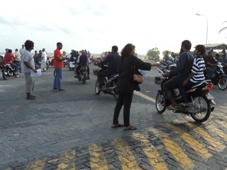Transparency Maldives’ 2013 Global Corruption Barometer Survey found 97 percent of respondents believed corruption was a problem in the public sector, while the 2013 Maldives Democracy Survey revealed an alarming lack of confidence in democratic institutions.
“Most striking of all, however, are the remarkably high levels of cynicism of the public. Maldivians are far more cynical than publics in other comparable countries,” concluded the ‘Democracy at the Crossroads’ report.
A position paper released by the anti-corruption NGO last week, however, suggests a way to repair the country’s threadbare trust in its public figures through an enhanced asset disclosure regime.
“Asset declaration generally requires a certain category of public officials—also identified as ‘politically exposed persons’ to describe individuals entrusted with prominent public functions—to disclose their financial and business interests,” explains TM’s paper.
TM note that an effective asset disclosure system can detect corruption, demonstrate the government’s commitment to fight corruption, help make officials accountable, and – crucially – increase public trust.
The paper was produced after consultations with the Anti-Corruption Commission, the secretary general of the Majlis, and with then-Auditor General Niyaz Ibrahim.
Niyaz was replaced in October after amendments to the Audit Act were rushed through the Majlis just days after a report from his office implicated tourism minister Ahmed Adeeb in a US$6 million corruption scandal.
The same report also noted that Adeeb had failed to disclose his assets – as required under Article 138 of the Constitution – since his appointment to the post in 2012.
Hobbled system
Although Adeeb has denied the allegations and since pledged to release his financial statement to the media, TM Advocacy and Communications Manager Aiman Rasheed feels the incident provides a perfect example of why asset disclosure is essential.
“I believe that it is a right for the public to know the truth regarding the allegations of corruption against Minister for Tourism Adeeb. Asset disclosure is a mechanism to put to rest baseless allegations and to hold to account perpetrators of corruption.”
Rasheed noted that, under the current asset disclosure system, it is impossible to either prove or disprove whether such charges are politically motivated attempts at defamation – as Adeeb has claimed.
“In addition to the already hobbled asset declaration system, the absence of a verification mechanism means allegations of corruption—in particular, those concerning misappropriation of funds and illicit enrichment—are not investigated,” read the position paper.
TM argue that various systemic deficits are hindering the effectiveness of the current constitutional provisions.
Members of the Majlis – perceived as the most corrupt institution in the 2013 corruption barometer – have previously told Minivan News of their support for asset disclosure, with some reservations.
While all MPs asked about the practice in a series of interviews prior to this year’s Majlis elections backed the system, some suggested the disclosure of family members’ assets and of individuals’ net wealth to be too invasive.
Former MP Abdulla Mausoom – who did not stand for re-election – also suggested that full public disclosure may reduce the quality of MPs, suggesting that voters may be reluctant to select less wealthy individuals.
A number of MPs suggested an alternative system whereby additional income gained after entering the Majlis be used to gauge any potentially illegal enrichment.
Recommendations
While the Constitution requires the president and cabinet, MPs, and judges to submit annual declarations to the auditor general, the Majlis, and the Judicial Services Commission, respectively, the subsequent information is not available to the public.
The former auditor general told TM that a lack of punitive measures for those failing to submit information rendered the system ineffective.
TM noted that the current system does not require the submission of assets for spouses and children of public officials “which makes cases of illicit enrichment and conflicts of interest invisible and harder to detect.”
“Moreover, the disclosure of business and activities outside the jurisdiction of Maldives, and details of substantial gifts or benefits are also not a requirement in the current system,” stated the paper.
Furthermore, a number of high level officials are overlooked altogether by the current system, including the vice president, members of independent institutions, officials of state-owned companies and even the auditor general himself.
The position paper concluded with a number of recommendations including greater uniformity in current regulations as well as support for their implementation.
TM called for full public disclosure of assets, noting the positive impact on public perceptions of corruption in countries where the public could access such records.
It was also noted that an independent verification mechanism would identify conflicts of interest as well as reducing undue influence.
“Perceived corruption is lower in countries that verify officials’ statement than in countries that do not verify declaration content,” said the NGO – citing the 2006 Global Corruption Report of its sister organisation Transparency International.
The same report was also mentioned to suggest that sanctions for non-compliance would also enhance the public’s trust in their democratic institutions.
“Implementing an strong asset disclosure regime would show the state’s commitment to fight corruption and would give a strong message to public servants, a message of zero tolerance to corruption,” said Rasheed.
“We must do away with the culture of secrecy to prevent illicit enrichment, fraud, etc, and to do that, asset disclosure is key.”
Related to this story
Transparency Maldives reveals growing perception of corruption
Democracy survey reveals crisis of confidence in democratic institutions


